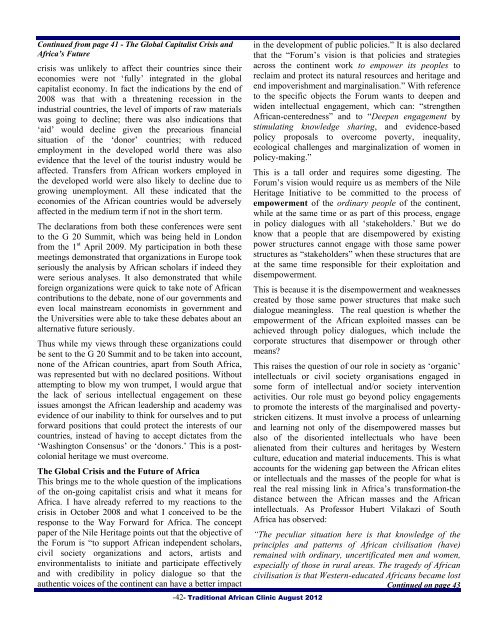African Traditional Herbal Research Clinic ... - Blackherbals.com
African Traditional Herbal Research Clinic ... - Blackherbals.com
African Traditional Herbal Research Clinic ... - Blackherbals.com
Create successful ePaper yourself
Turn your PDF publications into a flip-book with our unique Google optimized e-Paper software.
Continued from page 41 - The Global Capitalist Crisis and<br />
Africa’s Future<br />
crisis was unlikely to affect their countries since their<br />
economies were not ‘fully’ integrated in the global<br />
capitalist economy. In fact the indications by the end of<br />
2008 was that with a threatening recession in the<br />
industrial countries, the level of imports of raw materials<br />
was going to decline; there was also indications that<br />
‘aid’ would decline given the precarious financial<br />
situation of the ‘donor’ countries; with reduced<br />
employment in the developed world there was also<br />
evidence that the level of the tourist industry would be<br />
affected. Transfers from <strong>African</strong> workers employed in<br />
the developed world were also likely to decline due to<br />
growing unemployment. All these indicated that the<br />
economies of the <strong>African</strong> countries would be adversely<br />
affected in the medium term if not in the short term.<br />
The declarations from both these conferences were sent<br />
to the G 20 Summit, which was being held in London<br />
from the 1 st April 2009. My participation in both these<br />
meetings demonstrated that organizations in Europe took<br />
seriously the analysis by <strong>African</strong> scholars if indeed they<br />
were serious analyses. It also demonstrated that while<br />
foreign organizations were quick to take note of <strong>African</strong><br />
contributions to the debate, none of our governments and<br />
even local mainstream economists in government and<br />
the Universities were able to take these debates about an<br />
alternative future seriously.<br />
Thus while my views through these organizations could<br />
be sent to the G 20 Summit and to be taken into account,<br />
none of the <strong>African</strong> countries, apart from South Africa,<br />
was represented but with no declared positions. Without<br />
attempting to blow my won trumpet, I would argue that<br />
the lack of serious intellectual engagement on these<br />
issues amongst the <strong>African</strong> leadership and academy was<br />
evidence of our inability to think for ourselves and to put<br />
forward positions that could protect the interests of our<br />
countries, instead of having to accept dictates from the<br />
‘Washington Consensus’ or the ‘donors.’ This is a postcolonial<br />
heritage we must over<strong>com</strong>e.<br />
The Global Crisis and the Future of Africa<br />
This brings me to the whole question of the implications<br />
of the on-going capitalist crisis and what it means for<br />
Africa. I have already referred to my reactions to the<br />
crisis in October 2008 and what I conceived to be the<br />
response to the Way Forward for Africa. The concept<br />
paper of the Nile Heritage points out that the objective of<br />
the Forum is “to support <strong>African</strong> independent scholars,<br />
civil society organizations and actors, artists and<br />
environmentalists to initiate and participate effectively<br />
and with credibility in policy dialogue so that the<br />
authentic voices of the continent can have a better impact<br />
-42- <strong>Traditional</strong> <strong>African</strong> <strong>Clinic</strong> August 2012<br />
in the development of public policies.” It is also declared<br />
that the “Forum’s vision is that policies and strategies<br />
across the continent work to empower its peoples to<br />
reclaim and protect its natural resources and heritage and<br />
end impoverishment and marginalisation.” With reference<br />
to the specific objects the Forum wants to deepen and<br />
widen intellectual engagement, which can: “strengthen<br />
<strong>African</strong>-centeredness” and to “Deepen engagement by<br />
stimulating knowledge sharing, and evidence-based<br />
policy proposals to over<strong>com</strong>e poverty, inequality,<br />
ecological challenges and marginalization of women in<br />
policy-making.”<br />
This is a tall order and requires some digesting. The<br />
Forum’s vision would require us as members of the Nile<br />
Heritage Initiative to be <strong>com</strong>mitted to the process of<br />
empowerment of the ordinary people of the continent,<br />
while at the same time or as part of this process, engage<br />
in policy dialogues with all ‘stakeholders.’ But we do<br />
know that a people that are disempowered by existing<br />
power structures cannot engage with those same power<br />
structures as “stakeholders” when these structures that are<br />
at the same time responsible for their exploitation and<br />
disempowerment.<br />
This is because it is the disempowerment and weaknesses<br />
created by those same power structures that make such<br />
dialogue meaningless. The real question is whether the<br />
empowerment of the <strong>African</strong> exploited masses can be<br />
achieved through policy dialogues, which include the<br />
corporate structures that disempower or through other<br />
means?<br />
This raises the question of our role in society as ‘organic’<br />
intellectuals or civil society organisations engaged in<br />
some form of intellectual and/or society intervention<br />
activities. Our role must go beyond policy engagements<br />
to promote the interests of the marginalised and povertystricken<br />
citizens. It must involve a process of unlearning<br />
and learning not only of the disempowered masses but<br />
also of the disoriented intellectuals who have been<br />
alienated from their cultures and heritages by Western<br />
culture, education and material inducements. This is what<br />
accounts for the widening gap between the <strong>African</strong> elites<br />
or intellectuals and the masses of the people for what is<br />
real the real missing link in Africa’s transformation-the<br />
distance between the <strong>African</strong> masses and the <strong>African</strong><br />
intellectuals. As Professor Hubert Vilakazi of South<br />
Africa has observed:<br />
“The peculiar situation here is that knowledge of the<br />
principles and patterns of <strong>African</strong> civilisation (have)<br />
remained with ordinary, uncertificated men and women,<br />
especially of those in rural areas. The tragedy of <strong>African</strong><br />
civilisation is that Western-educated <strong>African</strong>s became lost<br />
Continued on page 43
















